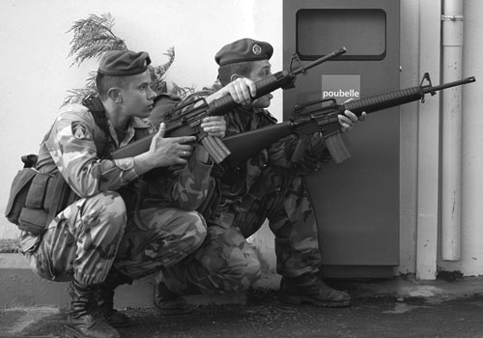Seven killed in Beirut violence
- BBC: Sunday, January 27th.

- Photo: Lebanese soldiers in Beirut.
Seven people have been killed in the Lebanese capital, Beirut, after a demonstration against power cuts descended into violence.
Shots were fired as the army intervened when protesters tried to block a road.
An activist from the opposition Shia Amal movement was killed, triggering violent protests in which six more people were killed, reports say.
Lebanese PM Fouad Siniora spoke of “most difficult and dangerous times” and declared Monday a day of mourning.
Meanwhile, Arab League foreign ministers meeting in Cairo called for army chief Michel Suleiman to be elected president, at the head of a national unity government.
A political deadlock has left Lebanon without a president since November. The Arab League ministers rejected a Syrian proposal for more pro-Syrian representation in Lebanon’s cabinet.
“What is needed is a consensus solution,” said Arab League Secretary-General Amr Moussa, “not the opinion of this or that.”
Violence spreads
As fighting spread in Beirut, sporadic gunfire was heard and the airport road was temporarily blocked by tyres.
A security official said gunmen had opened fire on troops as they tried to break up the demonstration.
He said the soldiers had then fired warning shots to disperse the protestors.
But crowds of angry opposition supporters took to the streets around the capital, and in Shia parts of southern Lebanon, as news of the shooting spread.
Sunday’s demonstration in southern Beirut’s Mar Makhaeil suburb had been against chronic electricity cuts in predominantly Shia areas of the capital.
Amal released a statement saying the dead activist had not been involved in the protests, and it remains unclear who was responsible for his death.
Sniper fears
The BBC’s Jim Muir in Beirut says there are concerns that snipers with unclear affiliations had fired shots from nearby buildings in an attempt to stir up trouble.
Amal is part of an opposition alliance, led by the Shia militant group Hezbollah, that has been locked in a power struggle for more than a year with the Western-backed government of Prime Minister Siniora.
Mr Siniora’s supporters have accused Amal and Hezbollah of exploiting social and economic issues for political ends. Both parties have denied doing so.
They urged their supporters to leave the streets as army reinforcements were deployed later on Sunday.
But bursts of gunfire continued into the night around the scene of the first shooting in Mar Makhaeil.
And in the nearby suburb of Ain Roummaneh, the site of a massacre that had triggered Lebanon’s 1975-1990 civil war, a hand grenade wounded seven people and cars were set ablaze, security sources said.
Acute instability
Mr Siniora urged calm and declared Monday a day of mourning. Schools and universities were to be closed.
“In these moments, our country is passing through its most difficult and dangerous times,” he said.
“What we have built during the past years is in danger of crumbling.”
Sunday’s violence was Beirut’s worst since street clashes a year ago between gangs of pro-government and pro-opposition supporters.
It followed a massive bomb blast on Friday which killed a senior Lebanese intelligence officer and three others in the east of the capital.
The latest deaths come at a time of acute political instability in Lebanon as deadlock between pro-Syrian and pro-Western parties drags on.
Syrian plan rejected
Participants at Cairo’s Arab League meeting on Sunday rejected Syria’s demand that Hezbollah and its allies have greater representation in Lebanon’s Cabinet.
Syrian Foreign Minister Walid Moallem had pushed for a new formula for Lebanese politics in which the pro-Syrian opposition would have 10 cabinet ministers, or one third of the seats.
Such a system would have given the Hezbollah-led opposition effective veto power, and the proposal was turned down by the ministers, AP reported.
Instead, the Arab League mandated Secretary-General Amr Moussa to push ahead with efforts to help rival parties reach an agreement on the make-up of a national unity cabinet.



What about lebanon in all this palestinian revolution? What happened to the freedom and peace lebanon has lost due to palestinian selfishness? Are the palestinians ever going to admit their wrongs and leave lebanon and its people in peace?
Commentaire par Lebanese Citizen — 8 février 2008 @ 23:05Violence has nothing to do good for everyone. This is a sad story to hear
Commentaire par John — 18 juillet 2010 @ 1:48